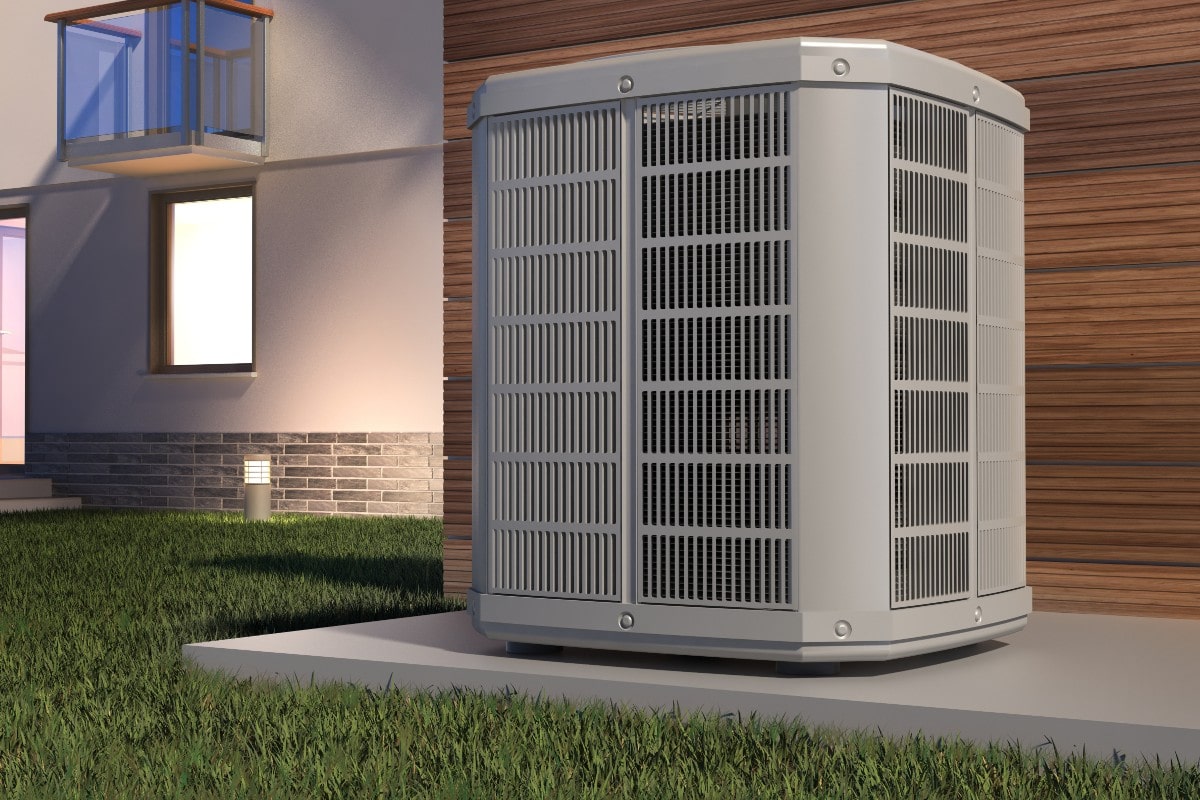Many people are quite surprised to discover their heat pump freezing up in winter. While it might be an unexpected issue, it’s relatively common. So, before you learn how to fix a heat pump freezing up in winter, let’s first understand why this happens.
Heat pumps work like a sponge, but instead of soaking up water, they soak up heat. They extract heat from the chilly outdoor air and bring it inside to warm your home. Yes, even in winter, there’s still some heat in the air outside that the heat pump can use.
However, there’s a catch. As the heat pump does its job, it also creates some condensation or wetness. If the weather gets really cold, this dampness can freeze, leading to your heat pump icing up. That’s when you know you have a problem.
How to Tell When the Heat Pump Is Iced Up
Before learning how to fix a heat pump freezing up in winter, it’s essential to recognize when it has frozen over. The most apparent sign is a layer of frost or ice on the outdoor unit’s coils. Additionally, the system may struggle to maintain your indoor temperature or make unfamiliar noises due to the ice blocking the fan’s rotation.
What Makes the Heat Pump Freeze Up in Winter?
Several factors contribute to a heat pump freezing up in winter, including low outdoor temperatures, high humidity, or insufficient airflow across the coils. Faulty defrost controls, malfunctioning fan motors, or issues with the refrigerant levels can also lead to your heat pump icing up.
Why Is a Frozen Heat Pump a Problem?
A frozen heat pump is more than a mere inconvenience. It’s an issue that can critically damage your system if not promptly addressed. The ice buildup prevents the heat pump from effectively transferring heat, stressing the entire system and leading to inefficiencies or even a complete breakdown.
A Step-by-Step Guide: How to Fix a Heat Pump Freezing Up in Winter
If you find your heat pump freezing up in winter, follow these steps:
1. Turn Off the Heat Pump: Always prioritize safety. Turn off the power to prevent further damage or injury.
2. Remove Ice Buildup: If there’s a thin layer of frost, you can let it melt naturally. For thicker ice, use warm (not hot) water to speed up the melting process.
3. Check the Defrost Cycle: Once all the ice is removed, turn on the heat pump to verify if the defrost cycle kicks in. If it doesn’t, the defrost controls might be faulty and require professional attention.
4. Inspect the Fan and Coils: Check for any damage to the fan or coils due to the ice buildup. If you spot any damage or are unsure, consider calling a professional.
Remember, extensive tinkering with the system might void your warranty. When in doubt, always contact a professional.
How Does a Heat Pump Work in Winter and Summer?
In winter, heat pumps extract heat from the outdoor air and transfer it inside. This transfer is achieved through changes in the pressure of the refrigerant or coolant. In summer, this process reverses. The unit takes heat from your home and moves it outdoors, cooling your indoor environment.
How to Defrost a Heat Pump in Winter
Typically, heat pumps have a built-in defrost cycle to prevent the unit from freezing up. However, if it’s not working, you can manually defrost the unit. Turn off the heat pump, remove the ice as described above, then restart the unit. If the issue persists, reach out to a professional. While it’s crucial to understand your heat pump and the reasons it might freeze up, it’s equally important to know when to seek professional assistance.
Persistent freezing could indicate a more severe underlying issue, such as refrigerant leaks, malfunctioning defrost controls or a faulty fan motor. In such cases, a professional will need to inspect the heat pump and make the necessary repairs.
How to Prevent the Heat Pump from Freezing Up Again
Regular maintenance is vital to avoid the problem of a heat pump freezing up in winter.
- Monitor the Airflow: Ensure nothing blocks the airflow around your heat pump. Keep plants, debris, and snow away from the unit.
- Regular Inspections: Have your heat pump professionally inspected at least once a year. Regular maintenance will catch potential issues before they lead to freezing.
- Check the Refrigerant Levels: Low refrigerant levels can cause your heat pump to freeze. Make sure the refrigerant levels are checked during your annual inspection.
- Install a Cover: A specially designed cover can help protect your heat pump from snow and ice. However, be cautious not to block the airflow.
- Use the ‘Auto’ Setting: Your heat pump’s thermostat likely has an ‘auto’ setting. This mode allows the system to switch into defrost mode when necessary, preventing ice buildup.
Conclusion
Having to fix a heat pump freezing up in winter is a common issue that the homeowner can often resolve. However, persistent problems may indicate a more serious underlying issue requiring professional attention. By understanding how your heat pump works and taking steps to maintain and protect it, you can keep your home warm all winter long.
Also Read: How Tall Is a Polar Bear Standing Up?

